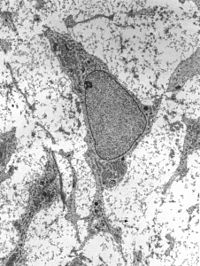
Photo from wikipedia
Mesenchymal stem cells (MSCs) exist in many tissues and can differentiate into cells of multiple lineages, such as adipocytes, osteoblasts, or chondrocytes. MSC administration has demonstrated therapeutic potential in various… Click to show full abstract
Mesenchymal stem cells (MSCs) exist in many tissues and can differentiate into cells of multiple lineages, such as adipocytes, osteoblasts, or chondrocytes. MSC administration has demonstrated therapeutic potential in various degenerative and inflammatory diseases (e.g., graft-vs.-host disease, multiple sclerosis, Crohn's disease, organ fibrosis, and diabetes mellitus [DM]). The mechanisms involved in the therapeutic effects of MSCs are multifaceted. Generally, implanted MSCs can migrate to sites of injury, where they establish an anti-inflammatory and regenerative microenvironment in damaged tissues. In addition, MSCs can modulate innate and adaptive immune responses through immunosuppressive mechanisms that involve immune cells, inflammatory cytokines, chemokines, and immunomodulatory factors. DM has a high prevalence worldwide; it also contributes to a high rate of mortality worldwide. MSCs offer a promising therapeutic agent to prevent or repair damage from DM and diabetic complications through properties such as multilineage differentiation, homing, promotion of angiogenesis, and immunomodulation (e.g., prevention of oxidative stress, fibrosis, and cell death). In this study, we review current findings regarding the immunomodulatory and regenerative mechanisms of MSCs, as well as their therapeutic applications in DM and DM-related complications.
Journal Title: Cellular reprogramming
Year Published: 2022
Link to full text (if available)
Share on Social Media: Sign Up to like & get
recommendations!